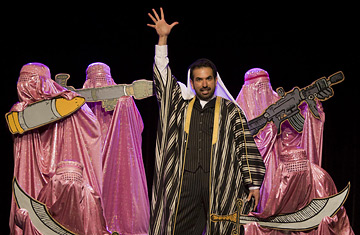
A scene from the European premiere of "Jihad: The Musical", in the C venue at the Edinburgh Fringe Festival.
Islamic terrorism has once again cast a shadow on the U.K., although this time the terrorists brandish cardboard weapons, wear shimmering pink burkas and intimidate their enemies with a high-kicking chorus line.
Jihad: The Musical, currently playing at Scotland's Edinburgh Fringe Festival, bills itself as a "madcap gallop through the wacky world of international terrorism." The satire features 12 original songs, including "Building a Bomb Today" and "I Only See Your Eyes," a love ballad sung to a veiled extremist.
Ahead of its premiere on Aug. 5, the musical came under fire for being staged just weeks after the failed terror attacks in London and Glasgow. Protestors launched a petition on Prime Minister Gordon Brown's Downing Street website that urges Brown to "condemn the tasteless portrayal of terrorism and its victims" and adds: "The idea of making light of Muslim extremism is extremely offensive, most especially for its victims." Brown has not commented publicly about the petition or the musical.
Jihad producer James Lawler of Silk Circle Productions says the show wasn't designed to stir up controversy. "It was developed in the same blitz spirit that characterized comedy during World War II," he says. "It's important to laugh at those things we're meant to fear."
The petition, which sparked widespread media coverage in Britain, may actually be drawing audiences to the show. Producers say the musical has filled its 160-seat theater to capacity during every performance thus far. A video clip of "I Wanna Be Like Osama" has also been viewed more than 125,000 times on YouTube.
The musical follows Sayid Al Boom, a young Afghan peasant who dreams of making it big as a flower farmer. He becomes enchanted by a mysterious veiled woman and takes up work at her "poppy export" company, only to learn later that she's a terrorist and her company is a front for a jihadi cell plotting to blow up an "Unidentified, Very Prestigious Landmark" in the West. A motley crew of extremists, who "rock the righteous to the jihad jive," recruit Sayid, and he must ultimately choose between betraying his new family or suicide.
Neither the writers nor the producer behind the musical are Muslim. Therefore, they say they took great care to avoid offending Islamic religion and culture. Zoe Samuel, co-author of the musical, says that several Muslims attended test performances and were amused by the show's content. She also says that the script distinguishes between everyday people and extremists. "We're not satirizing innocents. We're satirizing terrorists, neocons and apologists — people who exploit other people's beliefs to shore up their own power."
To that end, the audience comes to know the villain Hussein Al Mansour, a middle manager at the terror cell who is determined to become terrorist kingpin; Bilal, a flamboyant jihadi who declares his homosexuality in his martyr video; Liberty and Justice, airport security guards who conduct random security checks on passengers named Ali, Rashid and Abdullah; and Foxy Redstate, an ambitious broadcast journalist who uncovers the bomb plot, but keeps it quiet with the hope of landing an exclusive that will launch her to media stardom.
Early reviews have applauded the show for employing humor without losing sight of the underlying tragedy. At one point in the show, Hussein's henchman assert that Sayid "will go far" — well, "bits of him at least." And the foot-stomping number "I Wanna Be Like Osama" skewers Hussein's hunger for power: "While my lackeys loom like vultures, I'll declare a clash of cultures, kill civilians by the millions round the globe."
Jihad is not the first show to tackle fundamental Islam. Since 9/11, Muslim comedians have increasingly satirized the subject to slay suspicion and stereotypes, managing to dodge the controversy faced by Jihad. For Dean Obeidallah, co-founder of the New York Arab-American Comedy Festival, that comes down to identity. "The difference between us and the Jihad musical is that it's us — the people being negatively stereotyped — trying to break the stereotype ourselves." In the eyes of protesters, that may be what distinguishes a critical success from a bomb.
